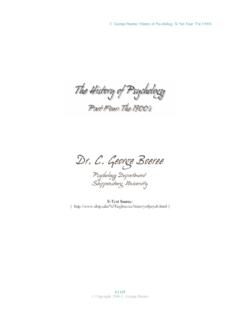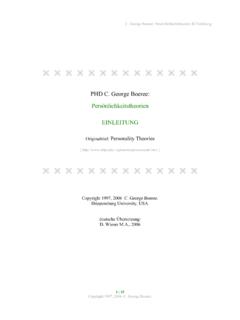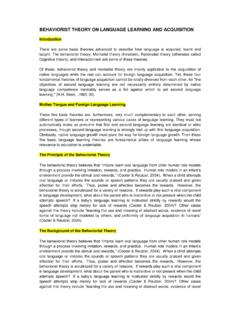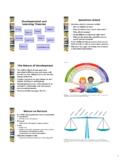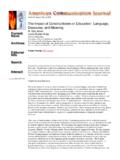Transcription of The Ultimate Theory of Personality - social-psychology.de
1 C. George Boeree: Personality Theories The Ultimate Theory of PersonalityThe Ultimate Theory of Personality Dr. C. George BoereePsychology DepartmentShippensburg UniversityOriginal E-Text-Site:[ ]1 | 13 Copyright 2000, 2006 C. George Boeree C. George Boeree: Personality Theories The Ultimate Theory of PersonalityIndex Index2 Introduction 3 Consciousness and the unconscious ..3 Stages ..4 Temperament ..5 Learning ..6 Emotions ..6 Motivation ..7 Neurosis ..8 Coping strategies ..9 Therapy ..10 Balance ..11 Conclusions 122 | 13 Copyright 2000, 2006 C. George Boeree C.
2 George Boeree: Personality Theories The Ultimate Theory of PersonalityIntroduction After a semester of Personality theories Freud and Jung and Rogers and Frankl and Bandura and Eysenck, etc., etc., etc. students often ask, once again, isn t there one Theory we can trust and use with confidence? Can t we narrow it down a bit? Tell us, what is right and what is not! Well, unfortunately, Personality is not yet a science, at least not in the sense that Biology or Chemistry are sciences. In those fields, although there is disagreement about details and the latest findings, there is a common body of knowledge that few people in the field argue about. Not so, obviously, in Personality . However, there are slowly emerging ideas that seem to pop up again and again in different theories, often with different names, but there none-the-less.
3 Sometimes they occur in theories that are otherwise quite different, or that come from a different perspective, such as clinical versus experimental versus factor analysis versus phenomenological. Perhaps the field will indeed become a science, perhaps not too far in the future! I know I m excited! So, I have taken the bull by the cojones, so to speak, and have compiled this little list of things I see as being, if not universal, at least more likely features of the future Ultimate Theory of Personality . Here Consciousness and the unconscious This, of course, is Freud s greatest contribution. Even if he didn t invent the terms, he certainly was responsible for popularizing them! Many theories postulate some sort of unconscious, not as a place where our worst fears bubble and boil, but as a way of accounting for the many things that influence us without our full awareness.
4 We can pick out three aspects of the unconscious. The first is biological. We come into this life with something like Freud's id or Jung's collective unconscious in place. It is likely composed of whatever instincts remain a part of our human nature, plus our temperament or inborn Personality , and perhaps the preprogramming for stages of life. This biological unconscious overlaps in part with the existentialist concept of for possible instincts, I would nominate four "complexes" of them: A mating complex, an assertive complex, a social complex, and a nurturant , there is the social unconscious (as Fromm calls it), which actually resembles Freud s superego more than Freud's id. It might include our language, social taboos, cultural habits, and so on. It includes all the cultural things we were surrounded with in our childhood and have learned so well that they have become "second nature" to us! The negative aspects of the social unconscious overlaps with the existential idea of fallenness and with Rogers idea of conditions of worth.
5 And third, there is the personal unconscious (to borrow Jung s term), perhaps understood as the unconscious aspect of the ego. It is composed of our idiosyncratic habits, the more personal things we have learned so well we no longer need to be conscious of them in order to enact them like knowing how to drive so well that we can comb our hair, talk on a cell phone, light a cigarette, and notice the attractive person in the rear view mirror all at the same time (at least until you run off the road into a tree). 3 | 13 Copyright 2000, 2006 C. George Boeree C. George Boeree: Personality Theories The Ultimate Theory of PersonalityIncluded among those well-learned things might be the defense mechanisms. With these we ignore, with habitual efficiency, uncomfortable realities in order to save our sense of self-worth. More a little let's not get overly enthusiastic about the unconscious! Few psychologists today view it as the location of our true selves, the answer to all our problems, or some deep psychic well that connects us with the universe or God!
6 It is where the more-or-less automatic processes of instinct and the well-learned do their this is in contrast to (in fact defined in contrast to) consciousness or awareness. Other than instincts and (perhaps) a few associations learned by classical conditioning, it seems that all things going into or out of our psyches pass through consciousness is will be a question for a good while longer. It s not terribly available to traditional research methods! But for now, we can see it as the ability to experience reality (outer and inner) together with its meaning or relevance to ourselves (as biological, social, and even individual organisms). Phew! I would add that it may be consciousness that also provides us with the freedom to choose among the choices available to us free will or at least self-determination. Perhaps the most important thing to keep in mind about consciousness is that it is personal. It is yours and yours alone. And it is within this personal consciousness that all of your "psychology" takes place.
7 Everything you feel, perceive, think, and do is based on your subjective view of reality, which may be significantly different from mine! Therefore, in order to understand people, we need to understand them from the inside. This little fact is what makes psychology so much more difficult than the physical sciences!Stages Stages are something most Personality theorists shy away from. Freud and Erikson are the obvious exceptions, as is the developmentalist Piaget. And yet there is a very biological basis for the idea. We can, on pure biology, separate out at least three stages: the fetus, the child, and the adult. This is, in fact, completely parallel to the egg, caterpillar, butterfly example we learned in high school biology! In addition, we can see three transitional stages: infancy, adolescence, and senescence.
8 Infancy is not, actually, found in more primitive animals, and is greatly exaggerated in humans. We are, in a sense, all born prematurely. Perhaps this was the result of an evolutionary dilemma: How can an upright creature give birth to a baby with a large head without killing the mom? That s right: Give birth before it gets too big! What that does for us is more than just let us live long enough to give birth again. It lets the infant soak up information much earlier, and in a different way. It would seem that for the first 6 to 12 months, our neural development is as yet incomplete. As we learn, we actually create certain neural paths, rather than just tightening synapses as we do later in life. It s a little like learning instincts!Adolescence also qualifies, I believe, as a stage. The transition from child to adult involves rather massive hormonal changes accompanied by a growth spurt like you hadn t seen since you were two!
9 It is hard for me to conceive of these changes not having some effect on us psychologically. Senescence is, strictly speaking, the last year or so of a full life, during which time the organs begin 4 | 13 Copyright 2000, 2006 C. George Boeree C. George Boeree: Personality Theories The Ultimate Theory of Personalityto deteriorate and shut down. We don't usually see this as a stage, and in fact most people never reach it (accidents and diseases usually beat senescence to the punch). But socially speaking, in our culture we certainly prepare ourselves for this inevitability, and that might constitute a social stage, if not a biological this last point suggests, there are certainly cultural additions we can make. In our culture, there is a sharp transition from preschool child to school child, and another sharp transition from single adult to married adult. For all the power of biology, these social stages can be every bit as powerful. To venture a guess as to the psychological side of these biological stages: The fetus focuses on biological development, which is transformed by the presence of others in the infant into ego development in the child.
10 In turn, the ego development of the child is transformed by the advent of sexuality in adolescence into the "trans-ego" or social development of the way I look at it is this: In the fetal and infancy stages, we lay the groundwork and develop our temperaments (founded in hormones and neurotransmitters). In the child stage, we develop a Personality (founded in habits). In adolescence, continuing into adulthood, we develop character (based on conscious decision-making).Temperament Temperament is what we call that part of our personalities or characters that is built in to us genetically. Consequentially, although there is always a degree of flexibility allowed, to a large extent we "are" our temperaments for our whole lives. Temperament is very "in" right now, and justifiably so. Jung led the way, Eysenck made it more scientifically acceptable, and the Big Five made it official.
